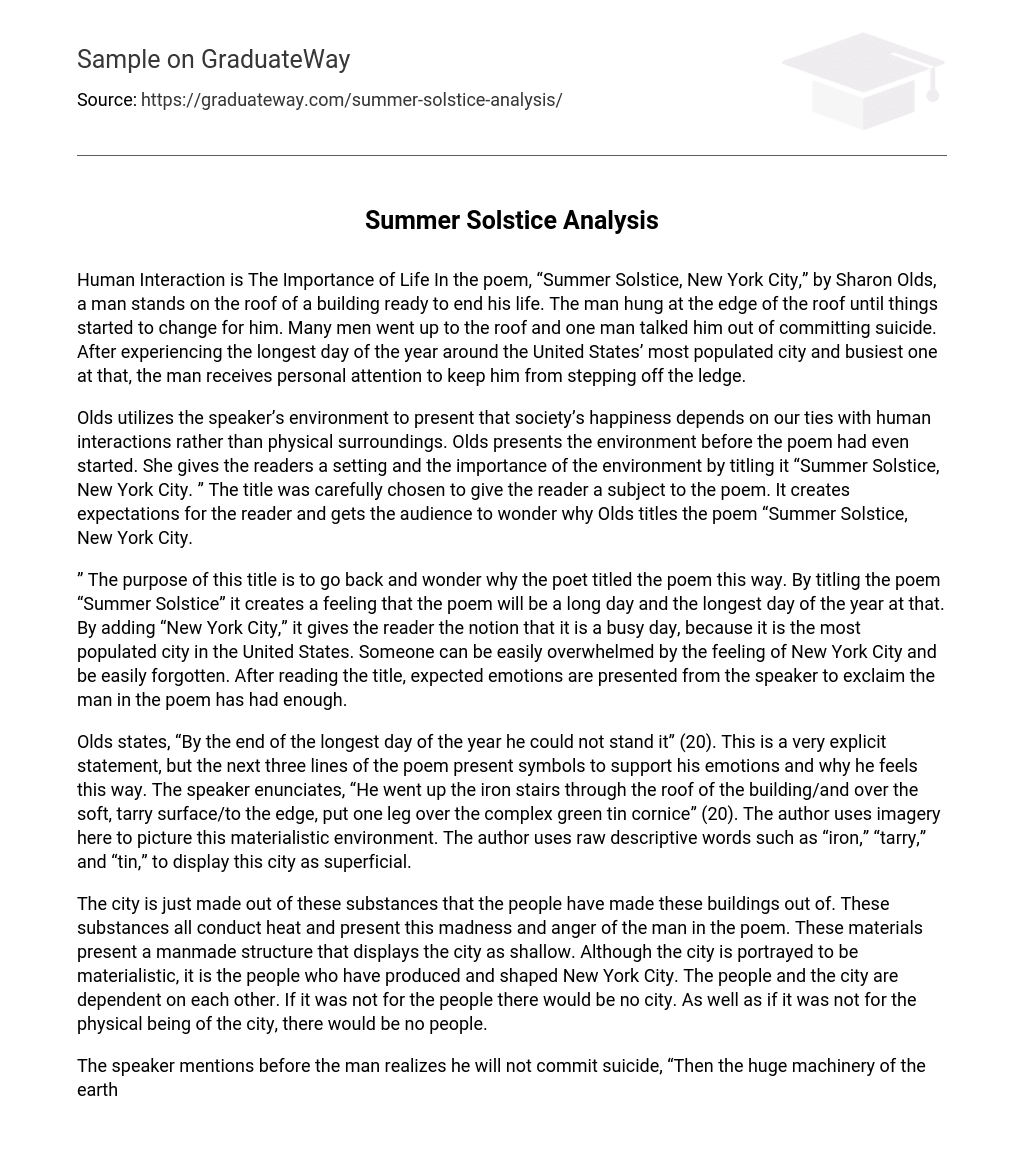Human Interaction is The Importance of Life In the poem, “Summer Solstice, New York City,” by Sharon Olds, a man stands on the roof of a building ready to end his life. The man hung at the edge of the roof until things started to change for him. Many men went up to the roof and one man talked him out of committing suicide. After experiencing the longest day of the year around the United States’ most populated city and busiest one at that, the man receives personal attention to keep him from stepping off the ledge.
Olds utilizes the speaker’s environment to present that society’s happiness depends on our ties with human interactions rather than physical surroundings. Olds presents the environment before the poem had even started. She gives the readers a setting and the importance of the environment by titling it “Summer Solstice, New York City. ” The title was carefully chosen to give the reader a subject to the poem. It creates expectations for the reader and gets the audience to wonder why Olds titles the poem “Summer Solstice, New York City.
” The purpose of this title is to go back and wonder why the poet titled the poem this way. By titling the poem “Summer Solstice” it creates a feeling that the poem will be a long day and the longest day of the year at that. By adding “New York City,” it gives the reader the notion that it is a busy day, because it is the most populated city in the United States. Someone can be easily overwhelmed by the feeling of New York City and be easily forgotten. After reading the title, expected emotions are presented from the speaker to exclaim the man in the poem has had enough.
Olds states, “By the end of the longest day of the year he could not stand it” (20). This is a very explicit statement, but the next three lines of the poem present symbols to support his emotions and why he feels this way. The speaker enunciates, “He went up the iron stairs through the roof of the building/and over the soft, tarry surface/to the edge, put one leg over the complex green tin cornice” (20). The author uses imagery here to picture this materialistic environment. The author uses raw descriptive words such as “iron,” “tarry,” and “tin,” to display this city as superficial.
The city is just made out of these substances that the people have made these buildings out of. These substances all conduct heat and present this madness and anger of the man in the poem. These materials present a manmade structure that displays the city as shallow. Although the city is portrayed to be materialistic, it is the people who have produced and shaped New York City. The people and the city are dependent on each other. If it was not for the people there would be no city. As well as if it was not for the physical being of the city, there would be no people.
The speaker mentions before the man realizes he will not commit suicide, “Then the huge machinery of the earth began to work for his life,” (20). After the metal materials are mentioned, the author uses personification to describe the “machinery,” the city, to save his life. The speaker finds a deeper meaning to the city. Although the man thought this “huge machinery” was working against him the whole time, it was the people of the city who are there to save his life. Every city has is a police system and a fire station.
If it was not for them the man would have gave up and died. The city saved his life. In a likewise manner, Olds presents the importance of humanity at the end of the poem by illustrating an allusion of a campfire from a cigarette. The speaker presents an allusion when they state, “. . . red, glowing ends burned like the/tiny campfires we lit at night” (21). Olds uses this campfire as a symbol of socialization. People socialize around a campfire and relax after a long day of work. This is exactly what these men did.
The cigarette presented a release of stress and the campfire displayed an occurrence of human interaction. A reader can complete the assumption that people need people more than they need things by looking at the man develop in this poem. The attitudes of this man change drastically throughout the poem. From it being a long day where everything was probably going wrong to being rescued by the cops of his city. This man needed human interaction to keep him living and not this city made of money and things. One with all the money in the world will never be as happy as a man who has friends.





